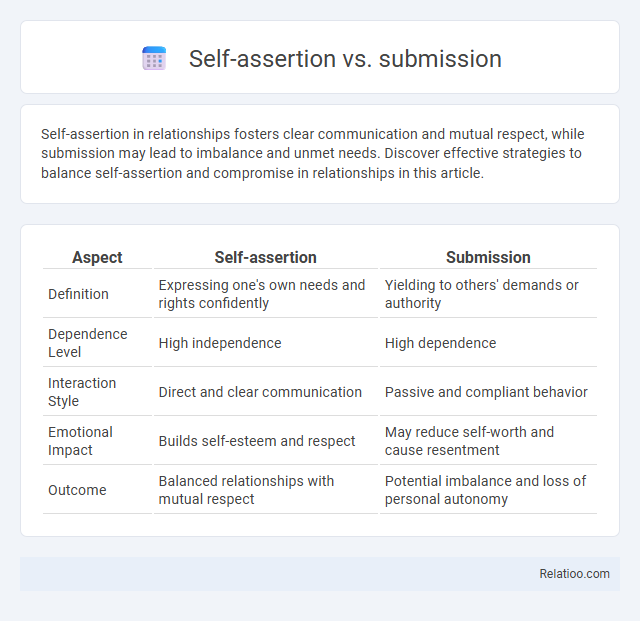Self-assertion in relationships fosters clear communication and mutual respect, while submission may lead to imbalance and unmet needs. Discover effective strategies to balance self-assertion and compromise in relationships in this article.
Table of Comparison
| Aspect | Self-assertion | Submission |
|---|---|---|
| Definition | Expressing one's own needs and rights confidently | Yielding to others' demands or authority |
| Dependence Level | High independence | High dependence |
| Interaction Style | Direct and clear communication | Passive and compliant behavior |
| Emotional Impact | Builds self-esteem and respect | May reduce self-worth and cause resentment |
| Outcome | Balanced relationships with mutual respect | Potential imbalance and loss of personal autonomy |
Understanding Self-Assertion: Key Concepts
Understanding self-assertion involves recognizing it as a confident and respectful expression of your thoughts, feelings, and needs without infringing on others' rights. Unlike submission, which often entails yielding to others' demands, or self-expression, which may lack the assertive clarity and boundaries, self-assertion balances honesty with respect. Developing this skill enhances personal empowerment and improves interpersonal communication by fostering clear and direct dialogue.
Defining Submission: Characteristics and Behaviors
Submission involves yielding to the authority or control of others, often characterized by compliance, passivity, and a reluctance to assert one's own rights or desires. Individuals exhibiting submission may avoid confrontation, prioritize others' needs over their own, and suppress personal opinions to maintain harmony. Understanding your tendency toward submission can help balance self-assertion and authentic self-expression for healthier interpersonal relationships.
Psychological Roots of Self-Assertion and Submission
Self-assertion stems from a strong sense of self-worth and the psychological need to establish personal boundaries, driven by intrinsic motivation to express autonomy and maintain respect in social interactions. Submission often originates from early experiences of powerlessness or fear of conflict, rooted in the desire to gain acceptance and avoid rejection, which can lead to suppressed needs and diminished self-esteem. Understanding these psychological roots helps you balance self-expression by recognizing when to assert your rights and when to adapt, fostering healthier relationships and emotional well-being.
Self-Assertion vs Submission in Communication
Self-assertion in communication involves confidently expressing one's thoughts, needs, and boundaries while respecting others, fostering mutual understanding and respect. Submission, by contrast, entails yielding to others' demands or opinions, often at the expense of one's own voice, which can lead to unbalanced relationships and internal frustration. Effective communication balances self-assertion to promote clarity and respect without descending into submission that diminishes personal agency.
The Impact on Personal Relationships
Self-assertion fosters healthy boundaries and mutual respect in personal relationships by promoting clear and honest communication of needs and feelings. Submission, often characterized by yielding to others' desires, can lead to imbalance and resentment, potentially undermining relationship satisfaction. Self-expression nurtures emotional intimacy and authenticity, allowing individuals to connect more deeply while maintaining their unique identity within the relationship.
Cultural Influences on Assertiveness and Submission
Cultural influences significantly shape the balance between self-assertion, submission, and self-expression, with collectivist societies often valuing submission and harmony over individual assertiveness. In contrast, individualistic cultures typically encourage self-assertion and open self-expression as a means of personal empowerment and identity formation. These cultural patterns impact communication styles, affecting interpersonal relationships and conflict resolution across different social contexts.
Balancing Assertiveness and Submission in the Workplace
Balancing assertiveness and submission in the workplace requires recognizing when to confidently express opinions and when to yield to others' perspectives for team harmony. Effective self-assertion promotes clear communication and decision-making, while strategic submission can foster collaboration and reduce conflict. Mastering this balance enhances workplace relationships, productivity, and professional growth by creating an environment where diverse views are respected and constructive dialogue thrives.
Overcoming Barriers to Self-Assertion
Overcoming barriers to self-assertion involves recognizing the difference between submission, which often stems from fear or low self-esteem, and self-expression, which emphasizes authentic communication of one's thoughts and feelings. Developing self-assertion requires building confidence, setting clear boundaries, and practicing effective communication skills to express needs and desires without aggression or passivity. Techniques such as cognitive restructuring, role-playing, and mindfulness can empower individuals to overcome internal obstacles and societal pressures that hinder assertive behavior.
The Benefits of Healthy Self-Expression
Healthy self-expression fosters emotional well-being by allowing individuals to communicate their true feelings and needs clearly and confidently without resorting to submission or aggressive self-assertion. This balanced approach improves interpersonal relationships, increases self-esteem, and reduces stress by promoting authentic interactions and respectful boundaries. Incorporating self-expression techniques such as active listening and assertive communication enhances personal growth and mental health outcomes.
Strategies for Cultivating Assertiveness Without Aggression
Cultivating assertiveness without aggression involves balancing clear communication of personal needs while respecting others' rights and boundaries. Techniques such as using "I" statements, practicing active listening, and maintaining calm body language enhance self-assertion without escalating conflict. Developing emotional intelligence and setting firm but empathetic boundaries fosters effective self-expression and prevents submission or passive behavior.

Infographic: Self-assertion vs Submission
 relatioo.com
relatioo.com